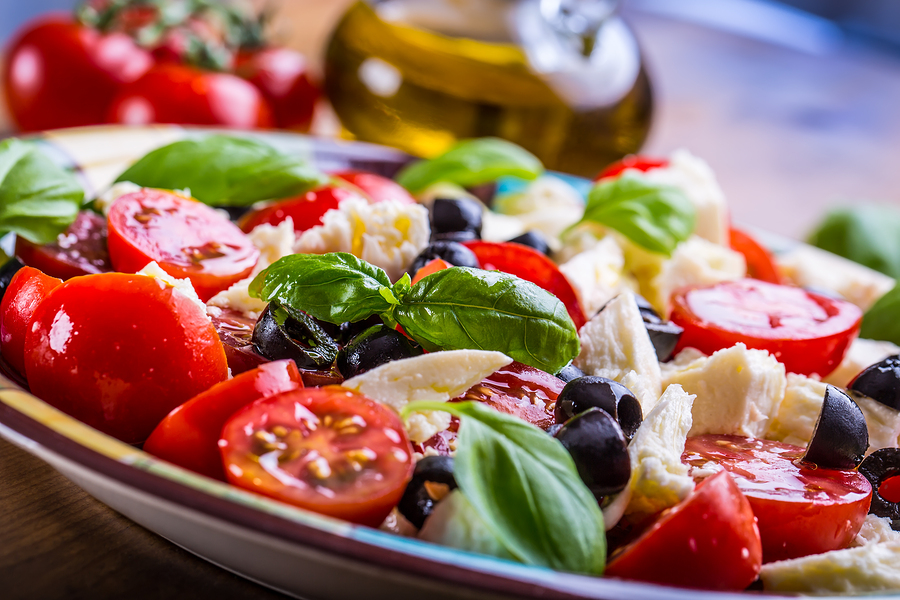The heart of a traditional Mediterranean diet is mainly vegetarian—much lower in meat and dairy than a standard Western diet—and uses fruit for dessert! So, it’s no surprise that those eating that way had very low heart disease rates compared to those eating standard Western diets. My video Mediterranean Diet & Atherosclerosis gives the lowdown on the link between the fats we eat and the health of our arteries.
RELATED STORY:
A landmark study has been cited to suggest that all types of fat—whether animal or vegetable—are associated with the appearance of new atherosclerotic lesions in our coronary arteries, which feed our hearts. About 100 men were given angiograms at baseline and then again two years later, looking for the development of coronary lesions, all while monitoring their diets every year. Only about 1 in 20 eating lower fat diets had new lesions, compared to about 8 in 20 on more typical American diets of around 33% or more fat. But, when the researchers drilled down, only three types of fat appeared to increase significantly the likelihood of the appearance of new lesions: lauric, oleic, and linoleic. Lauric acid is a saturated fat found in coconut oil and palm kernel oil, which can be found in such junk foods as whipped cream and candy bars. Oleic comes from the Latin word oleum, for olive oil, but that’s not where the subjects of this study were getting their oleic acid: The top sources for Americans are cake, chicken, and pork, and linoleic comes mostly from chicken. So, the study really just showed that people eating lots of junk, chicken, and pork tended to close off their coronary arteries.
RELATED STORY:
To see if major sources of plant fats like olive oil or nuts help or hurt, ideally we’d do a multi-year, randomized study where we’d take thousands of people, have one-third eat more nuts, another third eat more olive oil, and the final third do essentially nothing, and then see who does better. And that’s exactly what researchers did. The PREDIMED study took thousands of people in Spain who were at high risk for heart disease and were already eating a Mediterranean-ish diet, and randomized them into three groups for a couple of years—one group with added extra virgin olive oil, a second with added nuts, and a third group that was told to cut down on fat, but actually didn’t, so basically ended up as a no-dietary-changes control group. What happened to the amount of plaque in their arteries over time?
Whereas there was significant worsening of carotid artery thickening and plaque in the no-dietary-changes control group, those in the added-nuts group showed a significant reversal in thickening and an arrest in plaque progression. There were no significant changes in the added olive oil group.
“The richness of the plant-based MedDiet [Mediterranean diet] in potentially beneficial foods, such as fruit, vegetables, legumes, nuts, cereals, and olive oil, is believed to explain its cardioprotective effects.” However, these results suggest nuts are a preferable source of fat compared to olive oil and may “delay the progression of atherosclerosis, the harbinger of future cardiovascular events” such as stroke. Adding nuts appeared to cut the risk of stroke in half.
RELATED STORY:
Note, though, they were still having strokes, albeit half as many. So, the nuts appeared to be helping. However, they were still eating a diet conducive to strokes and heart attacks. All three groups had basically the same heart attack rates, the same overall death rates. That’s what Dr. Ornish, a proponent of a mostly whole foods, plant-based diet, noted when he commented on the study: “There was no significant reduction in the rates of heart attack, death from cardiovascular causes, or death from any cause,” only that stroke benefit. But, hey, that’s not nothing. A Mediterranean diet is certainly better than what most people are consuming, but a diet based on whole plant foods may be even better, since it’s shown to reverse heart disease, not contribute to it. The authors of the study replied that they didn’t wish to detract from Ornish’s work, noting that Mediterranean and plant-based diets actually share a great number of foods in common. Yes, Ornish’s diet can reverse heart disease. The major problem with the Ornish diet, argued proponents of the Mediterranean diet, is that it doesn’t taste good, so hardly anyone sticks to it.
In health,
Michael Greger, M.D.
*Article originally appeared at Nutrition Facts.












